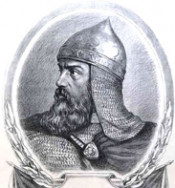
Dmitry Ivanovich Donskoy, Grand Prince of Vladimir and Moscow, was born
On October 12 1350 in Moscow in the family of the Prince Ivan Krasny, grandson of Ivan Kalita, was born son Dmitry, future Grand Prince of Vladimir and Moscow. When Ivan Krasny passed away in 1359 Dmitry ascended the throne of the Principality of Moscow. During his minority the government was actually ran by Metropolitan Alexey.
During the reign of Dmitry Ivanovich in 1367 was erected the first stone Moscow Kremlin in Russia. Being supported by the increased might of the Principality of Moscow, service Boyars and citizens, Prince Dmitry managed to overcome the resistance of rivals in a struggle for power — Princes of Suzdal-Nizhniy Novgorod, Ryazan and Tver.
In 1368 and 1370 the Moscow Army managed to resist an attack launched by Algirdas, Grand Duke of Lithuania on Moscow. When the war with Tver (1368-1375) was finished, Dmitry forced the Prince of Tver to recognize his seniority and team up in struggle against the Golden Horde. In 1376 the Principality of Moscow asserted its influence in the Volga-Kama Bolghar, whereas in 1378 the host of Dmitry inflicted a defeat on the Prince Oleg of Ryazan by Skornishchevo.
Dmitry Ivanovich was the first among Moscow princes to launch an armed struggle against Tatars. In 1378 the Tatar army under Begich on the Vozha River was defeated, and in 1380 Prince of Moscow headed united Russian forces and went to meet hordes of Tatar under Mamai, which were moving on Russia. In the battle of Kulikovo of 1380 which resulted into a defeat of the Horde, Dmitry Ivanovich displayed outstanding military leader’s abilities. It was for this victory that he was given the nickname “Donskoy”.
After the devastation of Moscow by the Tatar Khan Tokhtamysh in 1382 Dmitry organized works on reconstruction of the town. During his reign Moscow consolidated its leading positions in Russian lands. Dmitry Donskoy was the first to bequeath his titles to his eldest son Vasily without consulting the Khan.
For 30 years of his reign Dmitry Donskoy succeeded to become recognized as a head of anti-Horde policy in Russian lands, and a collector of Russian lands. By keeping friendly relations with Orthodox Byzantium, Dmitry was eager to achieve independency of the Russian Orthodox Church from Constantinople. During his reign in Moscow were constructed the Simonov and Andronikov Monasteries, which covered approaches to the city. For the first time in the Russian history the army was formed in accordance with territorial principle unlike the former “service” principle. It was under Dmitry Ivanovich that in Moscow long before other Russian principalities and lands was started silver coinage.
Dmitry Ivanovich Donskoy died in 1389 and was buried in Moscow in Arkhangelsk Cathedral of Kremlin. In 1988 the Grand Prince Dmitry was canonized by the Russian Orthodox Church.
The name of Dmitry Donskoy for several centuries became a symbol of Russian military glory. In 2002 was established the Order “For Services to the Fatherland” in the memory of the Saint Grand Prince Dmitry Donskoy and Saint Sergius of Radonezh.
Lit.: Духовная грамота (первая) Дмитрия Ивановича (Донского) (ок. 1375 г.) // Духовные и договорные грамоты великих и удельных князей XIV–XVI вв. // Подготовлено к печати Л. В. Черепниным. М.; Л., 1950; Карамзин Н. М. Великий князь Дмитрий Иванович Донской. 1363-1389 // История государства Российского. Т. 5. Гл. 1. М., 1993. С. 7-76; Лощиц Ю. М. Дмитрий Донской. М., 1983; Рапов М. А. Дмитрий Донской. М., 2002.
Based on the Presidential Library’s materials:
Иловайский Д. И. Куликовская победа Дмитрия Ивановича Донского: Исторический очерк. М., 1880;
Казадаев А. В. Историческое похвальное слово Димитрию Донскому. СПб., 1827;
Катаев И. О. Димитрий Донской и Куликовская битва: [По летописному сказанию]. Иркутск, 1863;
Московское княжество от смерти Дмитрия Донского до воцарения Иоанна Грозного. СПб., 1881;
Нечволодов А. Д. Сказания о русской земле: Ч. 1-4. СПб., 1913. Ч. 2. СПб., 1913;

